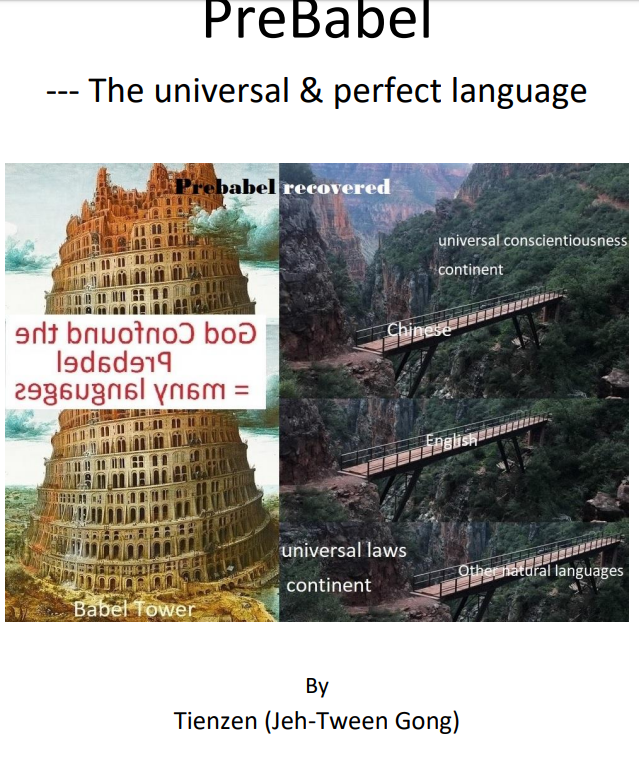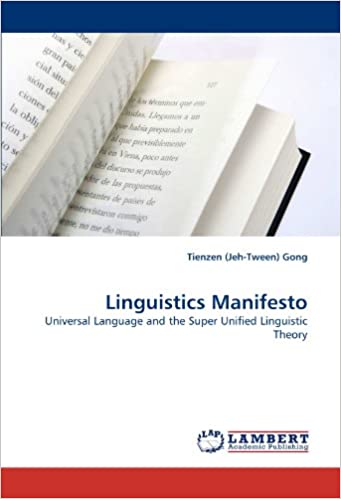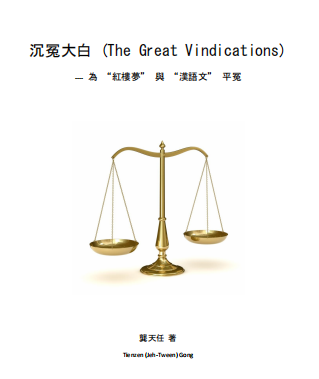一、前巴比伦语言—通用完美的语言
PreBabel — The universal & perfect language
https://tienzengong.files.wordpress.com/2018/03/prebabel-theuniversal.pdf
Prebabel — The Chinese Linguistic System Copyright © 2020 By Tienzen (Jeh-Tween) Gong Published by Chinese Etymology Institute Contact address: PO Box 4974 Diamond Bar, CA 91746, USA Web addresses:
http://www.chinese-word-roots.org/ http://chineselanguageetymology.blogspot.com/ http://www.prebabel.info/
Table of Content:
Preface 4
Introduction 12
Chapter One — A linguistic catastrophe and its great salvation 28
Chapter Two — Presentation at AP Annual Conference 2007 CollegeBoard 60
Chapter Three — Axiomatic & the perfect language 87
Chapter Four — Chinese theories before this New linguistics 115
Chapter Five — — Reinventing a new language lexicon set 136
Chapter Six — Constructing a perfect language, as the base for a universal language 155
Chapter Seven — A special verbal universe and its attributes 169
Chapter Eight — The Final Verification & Vindication 178
Chapter Nine — Sample lessons with this new linguistics 195
Chapter Ten — Some discussions with my students 226
Chapter Eleven — Discussions at LinkedIn (Chinese teachers group) 283
Chapter Twelve — The new Paradigm of Linguistics 357
Chapter Thirteen — Prebabel Recovered 375
Appendix 433
二、语言学宣言 《 Linguistics Manifesto 》
Amazon.com: Linguistics Manifesto: Universal Language and the Super Unified Linguistic Theory (9783838397221): Gong, Tienzen (Jeh-Tween): Books
https://www.amazon.com/Linguistics-Manifesto-Universal-Language-Linguistic/dp/3838397223
Linguistics is, seemingly, well-defined with some sub-fields, such as, phonology, morphology, syntax, semantics, pragmatics and some applied linguistics. Each sub-field encompasses all nature languages without a unified framework. That is, there is no common ground within or among these sub-fields linguistically to produce a universal language. Historically, the universal language was proclaimed with the economical and political supremacy, such as, Greek, Latin and English, etc.. They can, in fact, be the lingua franca for a short time period but will definitely fade into the history sooner or later. However, after the discovery of the PreBabel Principle in 2009, the linguistic based universal language and the Super Unified Linguistic Theory arose. A unified framework on linguistics is understood now. The following eight issues outline the framework of this Linguistics Manifesto.
1. The “Large Complex System Principle”
2. The three tier hierarchy of axiomatic systems
3. The Martian Language Thesis
4. The “Spider Web Principle
5. Super Unified Linguistic Theory
6. The PreBabel
7. The PreBabel (Chinese)
8. The new Paradigm of Linguistics
三、伟大的红楼、伟大的汉文
—-http://www.chinese-word-roots.org/The%20Great%20Vindications.pdf
沉冤大白 (The Great Vindications)
—- 為 “紅樓夢” 與 “漢語文” 平冤
Copyright © January 2013 by
Tienzen (Jeh-Tween) Gong
Published by Chinese Etymology Institute
Contact address:
P.O. Box 4794
Diamond Bar, CA 91765
Web addresses:
http://www.chinese-word-roots.org/
http://www.chineseetymology.com/
http://www.chineselanguageforums.com/
http://www.prebabel.info/
目錄 (Table of Content)
自序 (Preface)
(Part one) 沉冤大白 — 為 “紅樓夢”平冤
第一章: 評 “紅樓夢” 的 三大原則 (page #)
第二章: 普世價值一 (宿命與自由意志)
第三章: 普世價值二 (性事、愛情 與 儒家神學)
第四章: 先評 “中國的三大奇書”
第五章: “紅樓夢” 的宗旨 — 三綱
第六章: 原書 與 續集
第七章: “紅樓” 的仙佛世界 與塵世的因果報應
第八章: 色、 情、 淫與 意淫 (一)
第九章: 色、 情、 淫與 意淫 (二)
第十章: 色、 情、 淫與 意淫 (三)
第十一章: 紅樓中的儒家禮教
第十二章: 紅樓中的仙佛因果與緯讖
第十三章: 高鶚的續集 與 老紅學
3(Part two) 沉冤大白 — 為 “漢語文” 平冤
第十四章: 百年沉冤 “漢語文”
第十五章: 語言學的 夢想
第十六章: “一二三萬” 的語文
第十七章: 丟死人的 “沉冤”
第十八章: 最偉大與完美的 “語法”
第十九章: 最偉大的語文
(Part Three) 沉冤大白: The new Chinese Etymology
Chapter 20 —- The background history before this new Chinese etymology
Chapter 21 —- The claims of this new Chinese etymology
Chapter 22 —- The only axiomatic human language
Chapter 23 —- About 形 聲(phonetic loan) and 會 意(sense determinators)
Chapter 24 —- Accommodating a verbal universe by the written system
Chapter 25 —- The evolution of Chinese etymology and the verifications of four premises
Chapter 26 —- The Conceptual Language and Super Unified Linguistics paradigm
Chapter 27 —- Wrong to the young students! (誤 人 子 弟)!
Chapter 28 —- 500 examples of this new Chinese etymology



